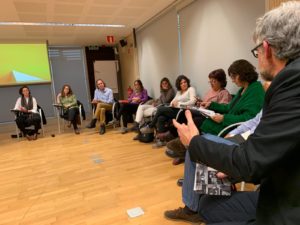On May 7, ICEERS organized a “Human Rights Agora” at the Parc de Recerca Biomèdica de Barcelona. The Agora on science and human rights is an initiative of the Estructura de Drets Humans de Catalunya and Síndic de Greuges. Each Agora (over 30 have been held over the past several months in Catalonia) is organized by the community and non-governmental organizations. The objective of these events is to generate dialogue and proposals that will inform civil society petitions made to local government (the Generalitat de Catalunya).
Community dialogue explores the right to health
The Agora that ICEERS organized examined the intersection between right to benefit from scientific progress and the right to achieve the highest possible health status. Our work frequently discusses these rights – as related to legal defense and the promotion of human rights-based drug policies, and to the limitations encountered when conducting scientific research with psychoactive substances, among others. While in some cases the non-compliance of these rights has been explicitly assessed (see for example here and here), in other cases, such as regarding the right to conduct scientific research, non-compliance is a bit more indirect. ICEERS took this opportunity to explore this topic to promote community dialogue in a setting that could have an impact on local politics to address science and human rights.
Medical cannabis
An example of where these rights are violated is in the case of patients who decide to use cannabis therapeutically. One of the key issues is that research with cannabis has some remarkable limitations. There are many financial, administrative or even epistemological barriers that hamper research on the therapeutic potential of cannabis. Even if these barriers are surmounted, researchers often run into regulatory or political obstacles that widen the distance between what can be explored in scientific settings and the reality of clinical practice. These challenges have an impact in that they impede safe, free, and timely access to medical cannabis. The right to achieve the highest physical and psychological health status is also systematically violated.
The complexities of this problem motivated the team at ICEERS to focus on this topic, building on the work that we have done through our Cannabmed program area over the past three years. The Agora was well attended – there were attendees from the Catalonian Human Rights Institute (Institut de Drets Humans of Catalunya) and the PRBB as well as over 20 attendees from different areas of expertise, including researchers, anthropologists, medical doctors, patients using medical cannabis, activists, social workers, politicians, among others.
Regulatory or political obstacles widen the distance between scientific research and the reality of the clinical practice.
Science and human rights
The dialogue began with a “diagnosis” of the problem. Researchers noted how difficult is to conduct independent research (i.e. not linked to pharmaceutical industry) on psychoactive substances. The primary difficulty is related to funding. Firstly, some research institutions are demanding the same overheads that they require to the pharmaceutical industry. Additionally, due to the current stigma and prohibitionist models, government grants tend to be provided to large research groups that focus on finding the adverse effects of substances such as cannabis. Small research teams that are interested in researching potential benefits face more barriers to starting studies.

Patients participating in the dialogue expressed their astonishment and desperation regarding the current scenario, sharing that they find it hard to make sense of the political and scientific debates. What is most important to them is to find solutions for their health challenges, and if cannabis or any other plant can help, they require safe and timely access.
After this initial discussion, the group moved to discuss proposals for resolving some of these challenges. The result was a list of concrete proposals which will be included in the report that will be delivered to the Catalonian Parliament to inform planning around addressing human rights. Proposals included:
- Documenting and highlighting the financial, administrative and legal obstacles impeding scientific research with psychoactive substances, and how this affects patients;
- Enabling research with psychoactive substances in Catalonia, which can be used to develop drug policies that are based on human rights;
- Recognizing the diversity of disciplines and types of knowledge when gathering information and conducting research;
- Conducting more research with a gender perspective;
- Developing concrete measures to enable independent scientists to conduct research, including removing barriers to accessing research funding.
Images by ICEERS
Categories:
NEWS
, Others
, HUMAN RIGHTS
, RESEARCH & INNOVATION
Tags:
Human Rights
, science
, cannabis
, agora
, Catalonia

